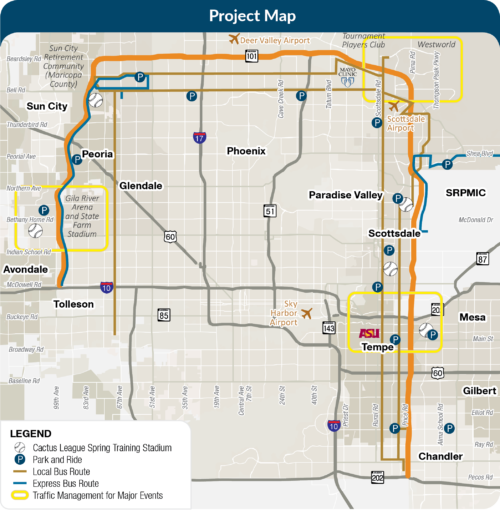What is the Loop 101 Mobility Project?
State Route 101L (Loop 101) is a 61-mile loop freeway corridor in the Phoenix metropolitan area and connects residents and tourists to key event centers, educational institutions, and all interstate corridors in the Phoenix metro area. The Loop 101 Mobility Project will address challenges along the corridor by providing freeway and arterial integrated strategies, resources and processes to improve incident response, congestion management, advance traveler information availability and transit accessibility.
Jointly led by ADOT and MCDOT the Loop 101 Mobility Partnership was formed to advance this corridor as a model deployment for Integrated Corridor Management (ICM) and connected vehicle initiatives. The Partnership includes:
- Arizona Department of Transportation (ADOT)
- Arizona Department of Public Safety (AZDPS)
- Federal Highway Administration (FHWA)
- Maricopa County Department of Transportation (MCDOT)
- Maricopa Association of Governments (MAG)
- Valley Metro (transit and light rail)
- City of Glendale
- City of Mesa
- City of Peoria
- City of Phoenix
- City of Chandler
- City of Tempe
- University of Arizona
- Arizona State University
The partners applied for and received a federal grant through the FHWA Advanced Transportation and Congestion Management Technologies Deployment (ATCMTD) program, which will be utilized to fund the majority of the project, including the design, development, and integration of a decision support system (DSS).
Loop 101 Program Components:
This Loop 101 Mobility Project leverages significant investments over the years by ADOT, MCDOT, Valley Metro, MAG and local agencies in freeway, arterial, and transit operations and management strategies. Building on the successful ADOT Freeway Management System (FMS) and several regional/local agencies’ traffic operations and management systems, Integrated Corridor Management (ICM) will facilitate improved real-time freeway-arterial coordination when incidents impact Loop 101 and divert traffic onto local streets.
The Loop 101 Mobility Project includes:
- A decision-support system to facilitate ICM on Loop 101
- Adaptive ramp metering
- Adaptive signal control technologies for special events in Glendale
- Connected vehicle applications for transit and emergency vehicles in Scottsdale
Loop 101 Mobility Program Goals:
- Improve safety and the use of existing arterial capacity in the Loop 101 corridor by deploying technology and systems to support ICM through a decision support system.
- Enhance public transportation service and incident response by using lessons learned from the MCDOT SMARTDrive connected vehicle testbed in Anthem, Arizona to deploy intelligent signal priority within the corridor.
- Elevate transportation operations partnerships with public sector agencies and innovative private sector partners
- Use regional experience combined with advanced technologies to improve traffic management operations for large-scale planned special events
- Improve data availability and consistency of traveler information to assist with traveler decision making and influence traveler behavior toward shared mobility.

